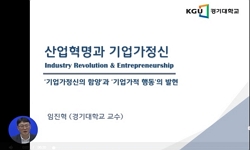본 연구 목적은 공감적 문제발견, 창의적 문제해결, 구현, 사회적 파급으로 구성된 앙트러프러너십 역량 개발 교육의 확산성을 높이고, 기존 해커톤, 경진대회 등 다양한 창의적 문제해결 및...
http://chineseinput.net/에서 pinyin(병음)방식으로 중국어를 변환할 수 있습니다.
변환된 중국어를 복사하여 사용하시면 됩니다.
- 中文 을 입력하시려면 zhongwen을 입력하시고 space를누르시면됩니다.
- 北京 을 입력하시려면 beijing을 입력하시고 space를 누르시면 됩니다.

사회적 파급력 강화를 위한 앙트러프러너십 교육의 모듈 프로그램 개발 연구 = Development Study of Entrepreneurship Education Module Program for Social Impact Reinforcement
한글로보기https://www.riss.kr/link?id=A109017916
- 저자
- 발행기관
- 학술지명
- 권호사항
-
발행연도
2024
-
작성언어
Korean
- 주제어
-
등재정보
KCI등재
-
자료형태
학술저널
- 발행기관 URL
-
수록면
77-111(35쪽)
- 제공처
-
0
상세조회 -
0
다운로드
부가정보
국문 초록 (Abstract)
본 연구 목적은 공감적 문제발견, 창의적 문제해결, 구현, 사회적 파급으로 구성된 앙트러프러너십 역량 개발 교육의 확산성을 높이고, 기존 해커톤, 경진대회 등 다양한 창의적 문제해결 및 구현 프로그램과 연계할 수 있도록 사회적 파급력을 강화하기 위한 앙트러프러너십 프로그램의 모듈 프로그램을 개발하는 것이다. 이를 위해 Richey와 Klein (2007/2012)의 개발연구 방법론의 분석-설계-개발-실행-평가의 단계로 연구를 진행하였다. 분석에서는 Reigeluth와 Merrill(1979)의 CMO(Conditions, Methods, Outcomes)에 근거하여 학습자 및 교수 변인을 분석하고, 개발된 프로그램의 초안은 4인의 전문가의 검토를 통해 수정 및 보완 사항을 수렴하여 보완하였다. 이를 바탕으로 초등학생 8명, 중학교 및 고등학생 14명을 대상으로 프로그램을 적용하였고, 학생의 프로그램 만족도는 4.52~4.86으로 나타나 만족하는 수준으로 나타났다. 최종적으로 학습자 및 참여한 전문 퍼실리테이터 5인의 개선의견을 수렴하여 프로그램의 개선방안을 도출하였다. 본 연구는 앙트러프러너십 교육의 모듈화 필요성을 확인하고, 기존 프로토타이핑이나 구현된 산출물에 비즈니스 모델 캔버스를 적용하여 차별화된 교육 방식을 제시한 점에서 그 의미가 있다. 더불어 비즈니스 모델 캔버스(BMC)를 활용한 교육이 학생에게 자신들의 산출물을 사회적으로 환원하고 지속가능하게 하는 과정의 중요성을 인식시키며, 아이디어를 구체화하고 실현 가능한 해결책으로 발전시키는 실천적 문제해결 역량을 향상시킬 수 있는 유익한 도구임을 확인했다는 점에서 의의가 있다.
다국어 초록 (Multilingual Abstract)
The purpose of this study is to develop an entrepreneurship module program aimed at enhancing entrepreneurship competency. This program encompasses empathetic problem finding, creative problem solving, implementation, and social impact. The aim is to ...
The purpose of this study is to develop an entrepreneurship module program aimed at enhancing entrepreneurship competency. This program encompasses empathetic problem finding, creative problem solving, implementation, and social impact. The aim is to strengthen social impact by integrating it with various creative problem-solving and implementation initiatives, such as hackathons and competitions. The research follows the analysis, design, development, implementation, and evaluation stages outlined in Richey and Klein’s (2012) development research methodology. During the analysis phase, learners and instructional variables were examined based on Reigeluth and Merrill’s (1979) CMO(Conditions, Methods, Outcomes) model. The initial program draft underwent revisions and enhancements following feedback from four experts. Subsequently, the program was implemented with 8 elementary school students and 14 middle and high school students. The participating students reported a high level of satisfaction with the program, rating it between 4.52 and 4.86 out of five. Finally, the study collected improvement suggestions from learners and five professional facilitators to derive an improvement plan for the program. This research holds significance as it highlights the necessity for modularizing entrepreneurship education. It introduces a differentiated education approach by integrating the business model canvas (BMC) into existing prototyping or implemented products. Moreover, it underscores the importance of education utilizing the BMC in fostering social responsibility among students and enhancing their practical problem-solving skills to transform ideas into viable solutions.
동일학술지(권/호) 다른 논문
-
생성형 인공지능 챗봇을 활용한 수학과 인공지능 융합 수업 모형 개발
- 한국교육공학회
- 고보경
- 2024
- KCI등재
-
마인크래프트를 활용한 메타버스 기반 프로그래밍 수업이 학습정서와 학습동기, 학습몰입도에 미치는 영향
- 한국교육공학회
- 배정민
- 2024
- KCI등재
-
대학생의 팀 프로젝트 기반 학습에서 갈등을 감지하는 ChatGPT 기반의 챗봇 개발
- 한국교육공학회
- 전신영
- 2024
- KCI등재
-
테크놀러지 통합 관점에서의 ‘ChatGPT를 활용한 논리적 글쓰기’ 교과목 개발 연구
- 한국교육공학회
- 정기인
- 2024
- KCI등재




 KCI
KCI KISS
KISS





